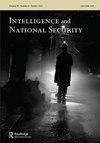Canadian Military Intelligence: operations and evolution from the October crisis to the war in Afghanistan
IF 0.8
3区 社会学
Q1 HISTORY
引用次数: 0
Abstract
1. This book is comprised of the following sections and chapters: ‘Introduction: A Pluralistic Approach to Intelligence Scholarship’ by Stephen Coulthart, Michael Landon-Murray, and Damien Van Puyvelde; ‘Part I. Framing Intelligence Research’; ‘1. Framing the Challenges and Opportunities of Intelligence Studies Research’ by Mark Phythian; ‘2. Confessions of an Intelligence Historian’ by John Ferris; ‘Part II. Data Sources and the Study of National Security Intelligence’; ‘3. The Why, Who, and How of Using Qualitative Interviews to Research Intelligence Practices’ by Damien Van Puyvelde; ‘4. The Use of Structured Behavioral Observation Systems to Address Research Questions in Intelligence’ by Misty Duke; ‘5. A Sociological Approach to Intelligence Studies’ by Bridget Rose Nolan; ‘Part III. Multidisciplinary Perspectives on National Security Intelligence Research’; ‘6. Enhancing Political Science Contributions to American Intelligence Studies’ by Stephen Marrin; ‘7. Can Decision Science Improve Intelligence Analysis?’ by David R. Mandel; ‘8. Charting a Research Agenda for Intelligence Studies Using Public Administration and Organization Theory Scholarship’ by Rick CaceresRodriguez and Michael Landon-Murray; ‘9. How the Field of Communication Can Contribute to the Understanding and Study of National Security Intelligence’ by Rubén Arcos; ‘Part IV. Beyond the Ivory Tower: The Research and Practice of Intelligence’; ‘10. Bridging the Gap: The Scholar-Practitioner Divide in Intelligence’ by Brent Durbin; ‘11. The Ivory Tower and the Fourth Estate’ by Paul Lashmar; ‘12. The Ethics of Intelligence Research’ by Ross Bellaby; ‘Conclusion: The Past, Present, and Future of Intelligence Research’ by Stephen Coulthart, Michael Landon-Murray, and Damien Van Puyvelde.加拿大军事情报:从十月危机到阿富汗战争的行动和演变
1.本书由以下章节组成:Stephen Coulthart、Michael Landon Murray和Damien Van Puyvelde的《引言:智力奖学金的多元方法》第一部分:框架情报研究1.《界定智力研究的挑战与机遇》,Mark Phythian著2.约翰·费里斯的《情报历史学家的自白》第二部分。数据来源与国家安全情报研究3.Damien Van Puyvelde的《为什么、谁和如何使用定性访谈来研究情报实践》4.米斯蒂·杜克的《使用结构化行为观察系统解决智力研究问题》5.布里奇特·罗斯·诺兰的《智力研究的社会学方法》第三部分“国家安全情报研究的多学科视角”6.斯蒂芬·马林的《加强政治学对美国情报研究的贡献》7.决策科学能改善智力分析吗大卫·R·曼德尔8.Rick Caceres Rodriguez和Michael Landon Murray的《利用公共管理和组织理论奖学金为智力研究制定研究议程》9.“通信领域如何有助于理解和研究国家安全情报”,作者:Rubén Arcos第四部分:象牙塔之外的情报研究与实践10.布伦特·德宾的《弥合鸿沟:学者与实践者的智力鸿沟》11.保罗·拉什马尔的《象牙塔与第四庄园》12.罗斯·贝拉比的《智力研究的伦理学》结论:《智力研究的过去、现在和未来》,Stephen Coulthart、Michael Landon Murray和Damien Van Puyvelde著。
本文章由计算机程序翻译,如有差异,请以英文原文为准。
求助全文
约1分钟内获得全文
求助全文
来源期刊

Intelligence and National Security
Multiple-
CiteScore
1.80
自引率
41.70%
发文量
93
期刊介绍:
Intelligence has never played a more prominent role in international politics than it does now in the early years of the twenty-first century. National intelligence services are larger than ever, and they are more transparent in their activities in the policy making of democratic nations. Intelligence and National Security is widely regarded as the world''s leading scholarly journal focused on the role of intelligence and secretive agencies in international relations. It examines this aspect of national security from a variety of perspectives and academic disciplines, with insightful articles research and written by leading experts based around the globe. Among the topics covered in the journal are: • the historical development of intelligence agencies • representations of intelligence in popular culture • public understandings and expectations related to intelligence • intelligence and ethics • intelligence collection and analysis • covert action and counterintelligence • privacy and intelligence accountability • the outsourcing of intelligence operations • the role of politics in intelligence activities • international intelligence cooperation and burden-sharing • the relationships among intelligence agencies, military organizations, and civilian policy departments. Authors for Intelligence and National Security come from a range of disciplines, including international affairs, history, sociology, political science, law, anthropology, philosophy, medicine, statistics, psychology, bio-sciences, and mathematics. These perspectives are regularly augmented by research submitted from current and former intelligence practitioners in several different nations. Each issue features a rich menu of articles about the uses (and occasional misuses) of intelligence, supplemented from time to time with special forums on current intelligence issues and interviews with leading intelligence officials.
 求助内容:
求助内容: 应助结果提醒方式:
应助结果提醒方式:


